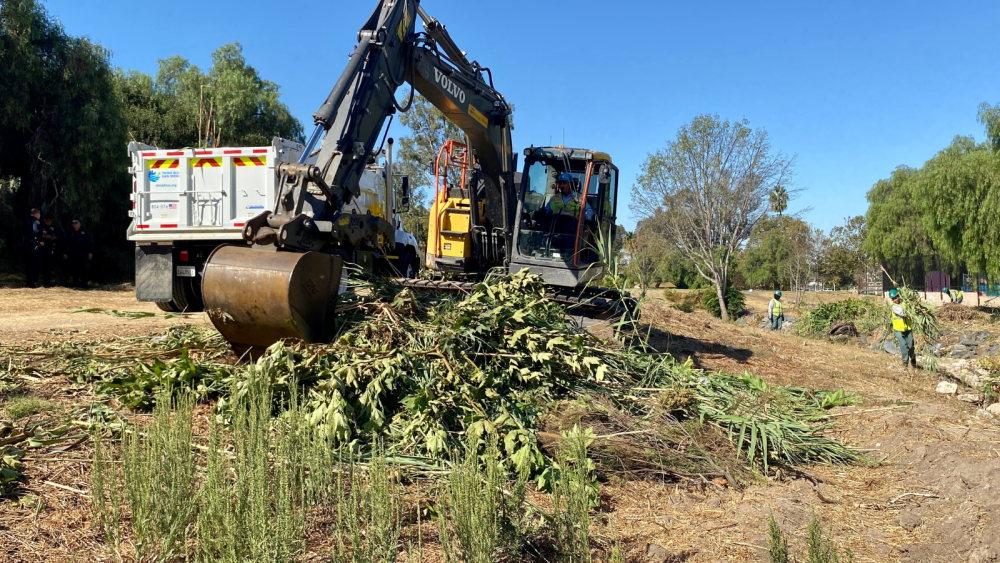New State Laws Will Streamline Channel Maintenance

With crews clearing brush and debris from an Encanto stormwater channel behind them, Mayor Todd Gloria and state Assemblymember David Alvarez today said the passage of two new state laws will help cities like San Diego take a more proactive approach to channel maintenance and upgrades by removing bureaucratic red tape.
Authored by Alvarez and sponsored by the City of San Diego, Assembly Bill 3227 – known as the “Streamlining Storm Water Channel Maintenance Act” – will expedite routine maintenance of stormwater channels and facilities by eliminating administrative delays usually imposed by the California Environment Quality Act (CEQA). The bill will apply to channels that are fully concrete or have less than a 100-year storm capacity to ensure they are adequately maintained ahead of significant weather events.
In addition, AB 2501 – also authored by Alvarez – allows for expedited review of permit applications for critical infrastructure projects addressing storm channel maintenance.
“These bills remove unnecessary regulatory hurdles that slow the clearing of stormwater channels, and they also will help speed upgrades to our infrastructure so that it can handle the more intense storms we anticipate from climate change,” said Mayor Gloria. “I’m grateful to Assemblymember Alvarez for partnering with us to tackle this issue head-on to make San Diego more flood-resilient and protect our communities as well as our beaches, bays and waterways.”
Stormwater channel maintenance can be slowed significantly by multiple environmental regulations and requirements. For channel maintenance work, it can take one to two years to process the components needed to obtain various approvals to proceed.
The City anticipates the new laws could reduce the administrative processing burdens of the current CEQA review process to a matter of months. Maintenance of most of the City’s 69-mile channel inventory will now qualify for an expedited CEQA review under Assembly Bill 3227.
More severe winter storms have made it more urgent to reduce this regulatory burden so that channels can be cleared and reinforced ahead of significant weather events.
“As San Diego experiences greater impacts from climate change, the demand to implement additional projects is growing rapidly and substantially,” said Assemblymember David Alvarez. “We need to be proactive and allow our cities and counties to take immediate steps to prepare for these events and use all available resources to safeguard vulnerable neighborhoods without any administrative delays. These bills aid San Diego in preparing for more frequent storms by significantly expediting approvals and eliminating any unnecessary bureaucratic processes.”
The City conducted emergency maintenance on about 18 miles citywide, including 12 miles of channels in the Chollas Creek watershed, following the emergency declaration in response to the historic Jan. 22 storm that caused significant flooding. Mayor Todd Gloria has included funding in the City’s Stormwater Department budget for this fiscal year to continue maintaining those channels at the same level ahead of the next rainy season.
“The ability to quickly and proactively conduct channel maintenance is a game-changer,” said Stormwater Department Director Todd Snyder. “We will now be able to get faster approvals to remove trash, vegetation and debris from our most critical channels ahead of the rainy season.”
The City’s aging stormwater system faces a $1.6 billion shortfall in needed funding to upgrade and modernize its infrastructure over the next five years. The vast infrastructure network is mainly hidden from public view but is critical to the City’s health and safety.
Learn more about the City’s infrastructure and channel maintenance efforts at thinkblue.org/stormwater-infrastructure.
Residents can report illegal dumping and trash near creeks or stormwater infrastructure on the “Get It Done” app, call 619-235-1000 or email swppp@sandiego.gov to report any instances of illegal dumping.
